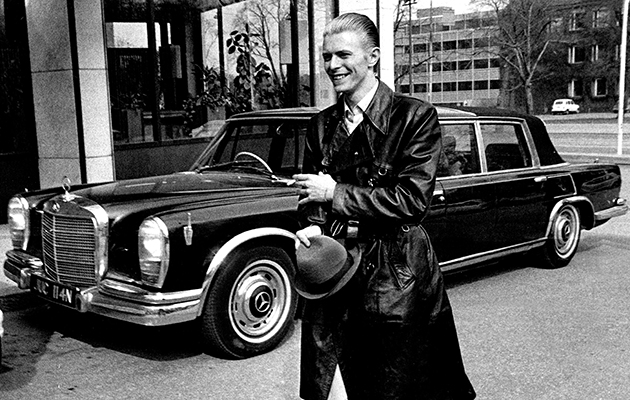“My complete being is within those three albums.” Rob Hughes and Stephen Dalton uncover the complete story of Bowie’s life-saving escape to Berlin. How he turned Iggy Pop into a health freak, embraced Brian Eno’s “oblique strategies”, documented Tony Visconti’s indiscretions, and made a fearless and remarkable trilogy… Originally published in Uncut’s April 2001 issue. Words: Stephen Dalton and Rob Hughes
______________________________
Berlin, 1976. Strung out and fiercely paranoid, David Bowie is convinced he has been royally screwed by a coke supplier over a deal. Cruising the city’s main drag, the Kurfürstendamm, in the rusty old open-topped Mercedes bought for him by faithful sidekicks Iggy “Jimmy” Pop and Corinne “Coco” Schwab, he spots the dealer in his car. Seething and possessed, Bowie rams his prey’s car mercilessly. Then he rams it again. And again. Then again and again and again.
“He looked around every second and I could see he was mortally terrified for his life,” Bowie would recall to a theatre audience assembled for his Bowie At The Beeb concert in 2000. “I rammed him for a good five to ten minutes. Nobody stopped me. Nobody did anything.”
Bowie finally comes to his senses and quits the crash scene before it gets ugly, but that same night he reaches “some kind of spiritual impasse”. He finds himself in a hotel garage, his foot jammed on the gas, racing around in circles at lunatic speed. The frazzled star decides, “this is so Kirk Douglas in that film where he lets go of the steering wheel.” So then, of course, he lets go of the wheel. But just as he does, the Mercedes runs out of petrol and splutters to a standstill. “Oh God,” Bowie sobs. “This is the story of my life!”
But he’s wrong. Because instead of running on empty, Bowie will now write a harrowing confessional called “Always Crashing In The Same Car”. And instead of dying at his peak, he will pick up the shattered pieces of his mind and distil them into the three most cathartic, challenging, influential, and plain magical albums of his career. And instead of becoming just another ’70s rock casualty, Bowie will fuse punk with electronica, black magic with white noise, amphetamine psychosis with spiritual healing. And, as a by-product of this process, he will accidentally invent the future of rock.
But just now, slumped over his steering wheel in a Berlin car park, Bowie is at the lowest point of a very bleak period. “As it happens,” he will later confess with gallows humour. “Things picked up after that.”
Did they ever.



